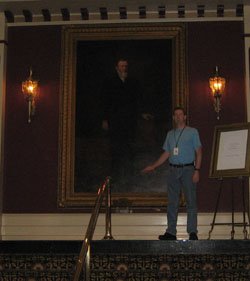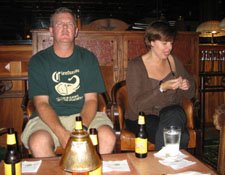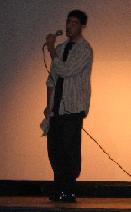Do Me A Favor. Throw It Hard!*
 Armed with a producer’s pass won at the Austin Screenwriter's Conference 2005 pitch competition I entered the Driskill hotel looking forward to the familiar sites and sounds of the conference I attended for the first time last year. What I wasn’t prepared for was the profound Groundhog Day-like déjà vu. When entering the lobby and the lounge and the bar and the hallways and the rooms, it was all exactly as I remembered it. Eerily the same. Like I had never left. The room, while on a different floor was located in the same relative place (1103 instead of 603). The desk, the armoire, the beds, indeed everything about the room was identical. This wasn’t surprising (It is a hotel), but added to the surreal feeling that saturated everything. One person observed that it felt like some of the fancy ballroom scenes in The Shining. I couldn’t agree more.
Armed with a producer’s pass won at the Austin Screenwriter's Conference 2005 pitch competition I entered the Driskill hotel looking forward to the familiar sites and sounds of the conference I attended for the first time last year. What I wasn’t prepared for was the profound Groundhog Day-like déjà vu. When entering the lobby and the lounge and the bar and the hallways and the rooms, it was all exactly as I remembered it. Eerily the same. Like I had never left. The room, while on a different floor was located in the same relative place (1103 instead of 603). The desk, the armoire, the beds, indeed everything about the room was identical. This wasn’t surprising (It is a hotel), but added to the surreal feeling that saturated everything. One person observed that it felt like some of the fancy ballroom scenes in The Shining. I couldn’t agree more.Luckily the feeling subsided after I joined up with my on-line friends, a great collection of upcoming talent that, for one reason or another, allow me to hang out with them. They are all great people and fun to be around. So let me give a shout-out to my peeps (links to blogs/sites included where possible and if I forget someone it is because I’m a forgetful bastard and not a petty schmuck): Ryan, Julie, Brett, Caroline, Shawna, Murray, Reece, Jon, James, Deborah, Ann, and Aaron. Together we could have been the single biggest group of people at the conference. A menacing gang of screenwriters who would just soon analyze your Act II turning point as look at you.

In one form or another we hung out together attending parties, lunches, panels, movies, and generally hoarding couches and chairs in the Driskill Lounge. The lounge was the beginning and end to every single day. For those that don’t know, a typical day goes something like this: Meet in the lounge, attend two panels in the morning, go to lunch, attend two panels in the afternoon, go to a dinner party, hang out/see movies, attend a late evening party from 11pm to 1am, and drag yourself back to the Driskill Lounge for an hour or two before going to bed. Rinse and repeat four days in a row.
The days are long, and by Saturday it feels like a marathon. The thought of attending yet another late night party swimming with budding screenwriters vying for a producer’s ear and scrambling to make friends with professional screenwriters seems like a beer-swilling chore. It is a competitive atmosphere requiring you to be “on” at all times, and wears you down.
 After awhile the cushy confines of the Driskill start to feel like a prison where conference goers are monitored and prevented from leaving a three block radius of the hotel.
After awhile the cushy confines of the Driskill start to feel like a prison where conference goers are monitored and prevented from leaving a three block radius of the hotel.All that said, I had a great time and wouldn’t change it for the world. Both exhausted and exhilarated at the end of the journey I crawled back to my home in Pennsylvania with a renewed vigor for this thing called screenwriting and a knowledge that I will visit this place again next year and start Ground Hog’s Day all over again.
*What movie is that line from and why is it relevant here? The winner gets an acknowledging nod from someone they admire.






